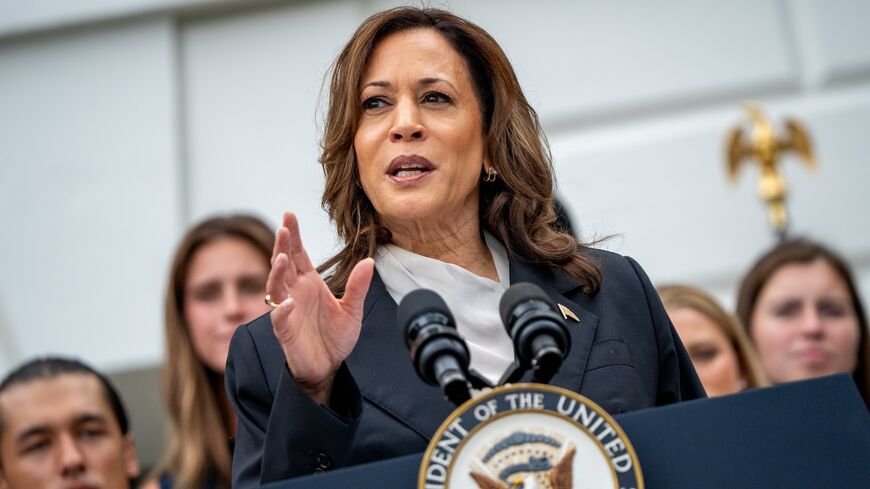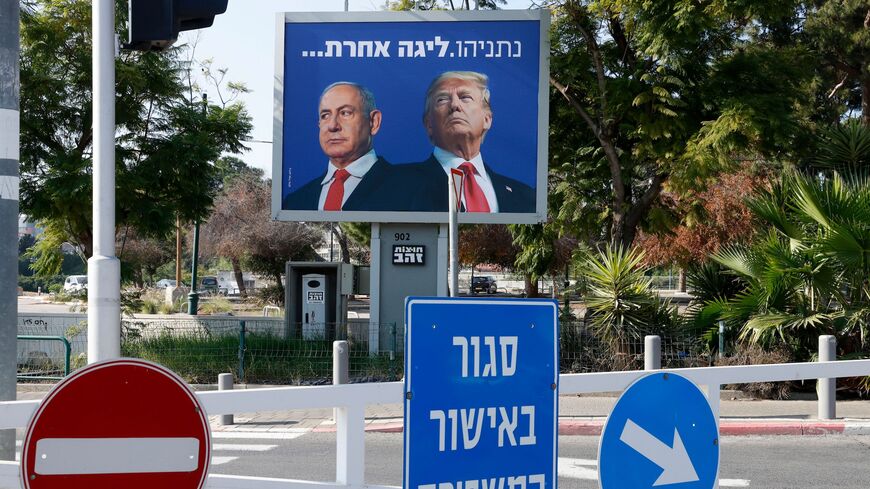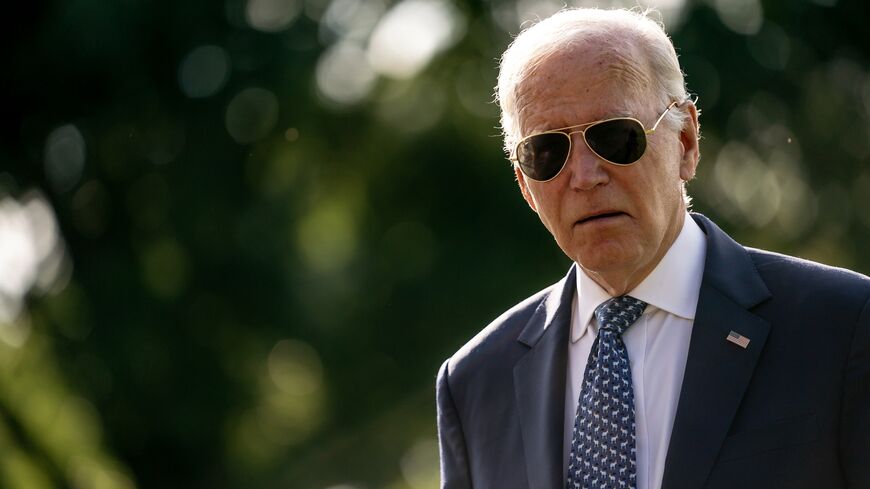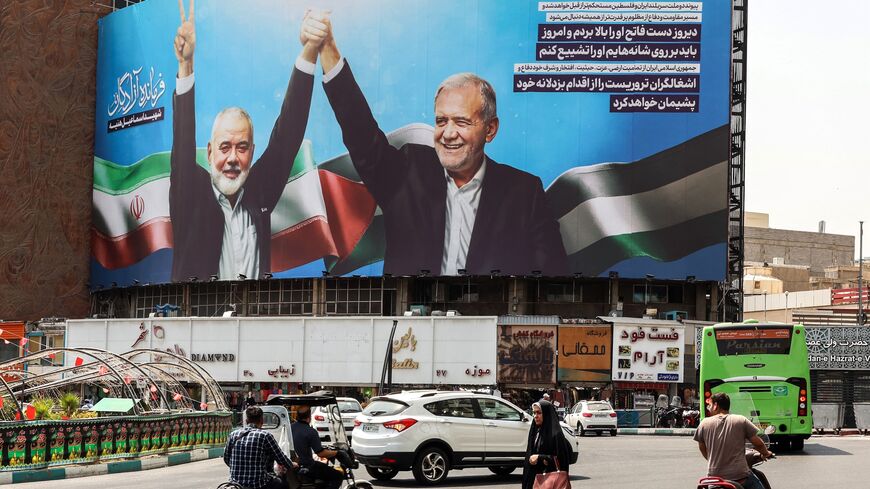Netanyahu’s ‘Abraham Alliance’ depends on path to Palestinian state
UAE raises the stakes for PA reform for postwar Gaza
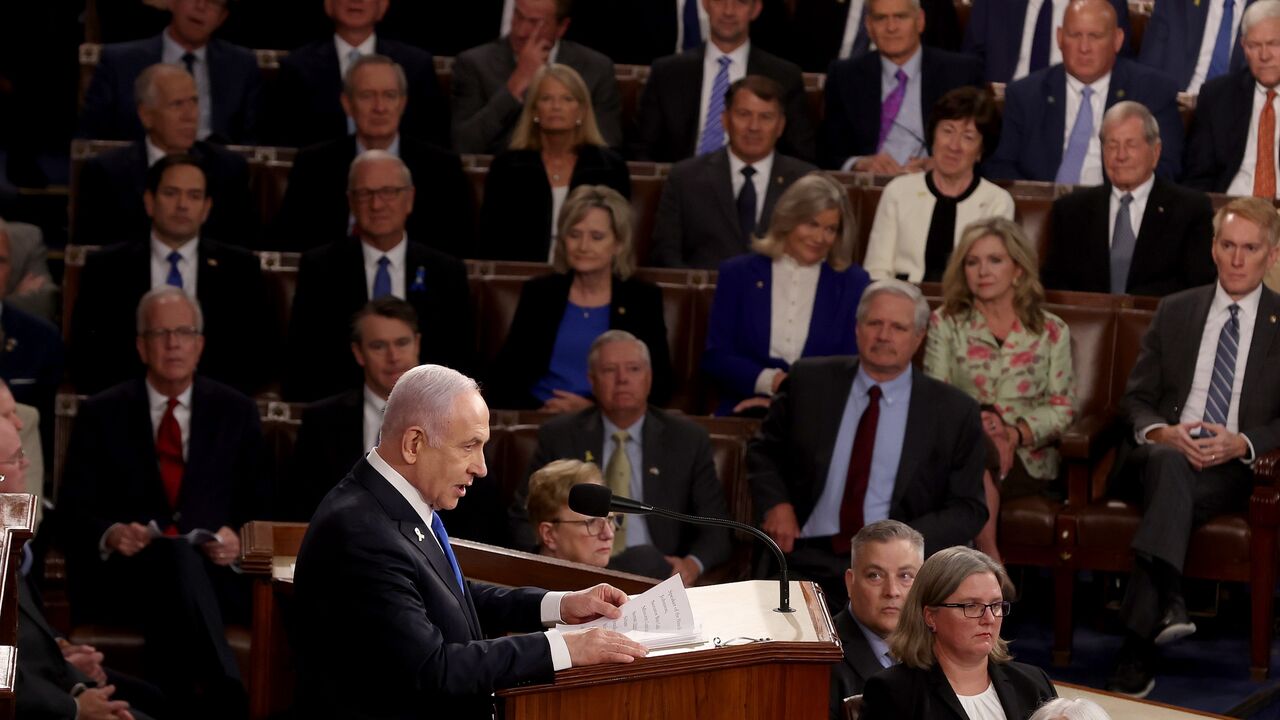
Netanyahu: 'Time will tell' on cease-fire
Israeli Prime Minister Benjamin Netanyahu came to Washington looking to dodge the Biden administration’s pressure to secure a cease-fire and hostage exchange.
While he glided around the subject in his remarks to Congress, Vice President Kamala Harris told him, in front of reporters on Thursday, that “it’s time to get this deal done,” as Bryant Harris reports.
Netanyahu reportedly was irked, and former US President Donald Trump — meeting with the Israeli PM Friday in Florida and running for president against Harris — called her remarks "disrespectful" toward Israel.
One potential sign of movement on a cease-fire, confirmed by Netanyahu before his meeting with Trump in Florida today, is that Israeli Mossad chief David Barnea will travel Sunday to Rome for another round of cease-fire talks with Qatar Prime Minister Mohammed bin Abdulrahman Al-Thani, US Central Intelligence Director William Burns and Egyptian intelligence chief Abbas Kamel.
Hamas suspended the talks on July 14 after Israeli airstrikes targeted military chief Mohammed Deif.
“I hope we are going to have a deal,” said Netanyahu, standing alongside Trump. “Time will tell.”
Hamas today reportedly rejected two conditions set by Netanyahu: that any deal include a mechanism for verifying that armed Hamas fighters are not among the Palestinians returning into northern Gaza, and that Israel retain control of the Gaza side of the Philadelphi Corridor to prevent weapons smuggling, as Rina Bassist reports.
There may be more pressure on Netanyahu behind the curtain, especially if US President Joe Biden is willing to condition release of the advanced weaponry Israel wants on its accepting a cease-fire, but that’s as yet unclear.
Netanyahu has been living on the edge with his right-wing coalition, which could bail if he accepts, but he seems to have weathered most storms, as the Knesset closes down on Sunday, July 28, for the next three months (resuming on Oct. 27).
Netanyahu's vision a ‘natural expansion of Abraham Accords'
What Netanyahu did offer in his speech to Congress is his vision for the postwar Middle East, and that’s worth a second look. In addition to the demilitarization and deradicalization of Gaza, referencing the conditions on Germany after World War II, the Israeli prime minister called for a new security arrangement, the "Abraham Alliance," which he described as a "natural expansion of the Abraham Accords,” for which he thanked Trump for his leadership.
The next step for an Abraham Alliance, if it were to happen, would be a full peace agreement between Israel and Saudi Arabia, but that all depends on Netanyahu agreeing on a path to a Palestinian state — which was missing from Netanyahu’s speech.
UAE raises the stakes on PA reform
As Ben Caspit first reported back on July 15, the UAE has stepped into the deadlocked discussions about security for the "day after" in Gaza, offering to lead a multinational force to help restore law and order and security as a first step.
The UAE, one of the four Abraham Accord countries that made peace with Israel in 2020, has one of the best-trained militaries in the Middle East.
Two days after Caspit’s article was published, on July 17, UAE Assistant Minister for Political Affairs and Special Envoy of the UAE Minister for Foreign Affairs Lana Nusseibeh wrote in the Financial Times that “any ‘day after’ effort must fundamentally alter the trajectory of the Israeli-Palestinian conflict towards the establishment of a Palestinian state that lives in peace and security with the state of Israel” — a position fully aligned with the Arab League.
Nusseibeh added that the UAE is willing to deploy its forces in support of an interim multinational force, assuming there is US leadership and a reformed and "legitimate" Palestinian Authority (PA), led by an "empowered" Palestinian prime minister.
The next day, on July 18, UAE Foreign Minister Abdullah bin Zayed Al Nahyan hosted the Biden administration’s Middle East envoy, Brett McGurk, and Israeli Minister for Strategic Affairs Ron Dermer to discuss details of the day after planning, according to Axios.
The UAE's emphasis on PA reform is more pronounced than other key Arab states involved in discussions of postwar Gaza. Abu Dhabi has been critical of the PA and of its present prime minister, Mohammed Mustafa, advocating for a return of former Prime Minister Salam Fayyad and a role for former Palestinian security chief Mohammed Dahlan.
Alongside Abu Dhabi's efforts, China brokered on Tuesday a reconciliation agreement between 14 Palestinian factions, including Fatah and Hamas. As Joyce Karam writes in Al-Monitor's China-Middle East newsletter, the agreement affirms that the Palestine Liberation Organization (PLO) is “the sole legitimate representative of all Palestinian people” and could allow, if conditions are met, for Hamas' entry to its legislative body.
The question of Palestinian reform could complicate already uncertain and complex talks on the future of Gaza. Palestinian President Mahmoud Abbas shows no signs of ceding even a sliver of authority to others, as the PA’s legitimacy among its own people is at an all-time low. A recent poll in the West Bank and Gaza reveals that only 12% of Palestinians are satisfied with Abbas, with 85% dissatisfied and about 90% wanting him to resign, as Daoud Kuttab reports here. Few Palestinians could even name Mustafa as prime minister.
More than 39,000 Palestinians have been killed, another 89,000 injured and 1.9 million displaced since the war began on Oct. 7, following Hamas’ killing of 1,200 Israelis.
Check out our coverage of Vice President Harris, Netanyahu’s visit to Washington:
- Ben Caspit’s analysis of Bibi’s address to Congress: Netanyahu delivers defiant speech, remains weak leader as Israel struggles in Gaza
- Elizabeth Hagedorn’s exclusive interview with former Israeli hostage Aviva Siegel: Former Israeli hostage's plea to Netanyahu: Take the deal
- Adam Lucente reports on what we could expect from a Harris Middle East policy: From Gaza to Iran: What Kamala Harris’ Middle East policy could look like
- Rina Bassist on Harris’ statements on Israel-Hamas war: What Kamala Harris has said on Israel, Gaza war
- Adam Lucente's quick take: Trump posts letter from Palestinian president ahead of Netanyahu meeting
Remembering Martin Indyk
Former US ambassador to Israel, assistant secretary of state for Near East Affairs, special assistant to President Clinton and special envoy under President Obama for Israeli-Palestinian negotiations Martin Indyk passed away this week at the age of 73. In honor of Ambassador Indyk’s memory and many contributions, I am sharing here Gilles Kepel’s interview with him from November 2021 on our "Reading the Middle East" video podcast about Martin’s book "Master of the Game: Henry Kissinger and the Art of Middle East Diplomacy," which is based on hours of conversations with the storied American diplomat and takes a deep dive into archival records to shed light on a watershed period in the history of the Middle East. Martin Indyk discusses his book "Master of the Game," and reflects on Kissinger’s diplomatic legacy in the Middle East (art19.com)
Finally, I hope you are enjoying our new website! Comments welcome, please.

